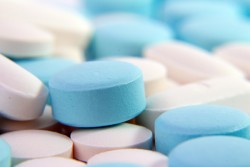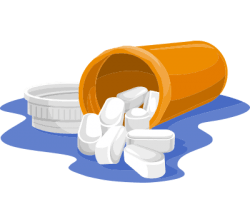 With the growing popularity of prescription pain medications, hydrocodone abuse has become increasingly common in the United States. Hydrocodone — found in prescription drugs like Vicodin, Norco, and Lortab — is one of the most effective and widely available analgesics on the market. This drug is prescribed as a pain reliever or cough suppressant, yet many users take this semi-synthetic opiate for its pleasurable effects. Taking hydrocodone for nonmedical purposes can result in an overdose, loss of consciousness, respiratory suppression, and death.
With the growing popularity of prescription pain medications, hydrocodone abuse has become increasingly common in the United States. Hydrocodone — found in prescription drugs like Vicodin, Norco, and Lortab — is one of the most effective and widely available analgesics on the market. This drug is prescribed as a pain reliever or cough suppressant, yet many users take this semi-synthetic opiate for its pleasurable effects. Taking hydrocodone for nonmedical purposes can result in an overdose, loss of consciousness, respiratory suppression, and death.
Hydrocodone Overdose Statistics
According to statistics reported in Pain Physician, close to 137 million prescriptions were written for medications containing hydrocodone in 2011. Reflecting this trend, the number of fatalities related to prescription opiate overdoses now exceeds the number of deaths caused by auto accidents, suicides, and illicit drug abuse. The U.S. Drug Enforcement Administration (DEA) presents the following statistics on hydrocodone:
- In 2012, over 25 million Americans reported that they have taken hydrocodone for recreational reasons at least once in their lives.
- Poison control centers in the US reported over 29,000 toxic exposures to hydrocodone in 2012 and over 35 deaths.
- Recreational Vicodin use was reported by 4.6 percent of 10th graders and over 5 percent of 12th graders in 2012.
- Nearly 82,500 emergency room visits in 2012 involved the use or abuse of hydrocodone.
In an effort to curb the problem of hydrocodone abuse and overdose, the federal government has increased restrictions on the distribution of this widely prescribed opioid, according to the U.S. Food and Drug Administration. In 2014, hydrocodone was reclassified as a Schedule II substance instead of a Schedule III drug, making it more difficult to obtain medications that contain hydrocodone.
Signs of a Hydrocodone Overdose
 Hydrocodone works by interacting with opioid receptors in the brain, nerves, and other organs that control sensations of pain and generate feelings of pleasure. As a central nervous system depressant, hydrocodone causes a general slowing down of physical and mental activity. When taken in large doses, medications like Vicodin and Norco can slow down the heartbeat and breathing to dangerous levels. The risk of a fatal overdose increases if the user has also abused alcohol, sleeping pills, anti-anxiety medications, or other substances that suppress the central nervous system.
Hydrocodone works by interacting with opioid receptors in the brain, nerves, and other organs that control sensations of pain and generate feelings of pleasure. As a central nervous system depressant, hydrocodone causes a general slowing down of physical and mental activity. When taken in large doses, medications like Vicodin and Norco can slow down the heartbeat and breathing to dangerous levels. The risk of a fatal overdose increases if the user has also abused alcohol, sleeping pills, anti-anxiety medications, or other substances that suppress the central nervous system.
The signs of a hydrocodone overdose include:
- Pale, cool skin
- A bluish tinge to skin or fingernails
- Small pupils that don’t react to light
- Tremors or shaking
- Slow breathing
- Slow pulse
- Confusion and drowsiness
- Unconsciousness
A hydrocodone overdose can be fatal. If you are with someone who has taken too much Vicodin and they display the symptoms of an overdose, seek medical help immediately.


